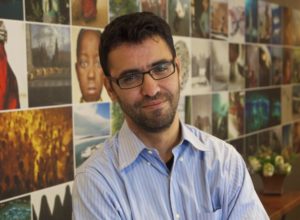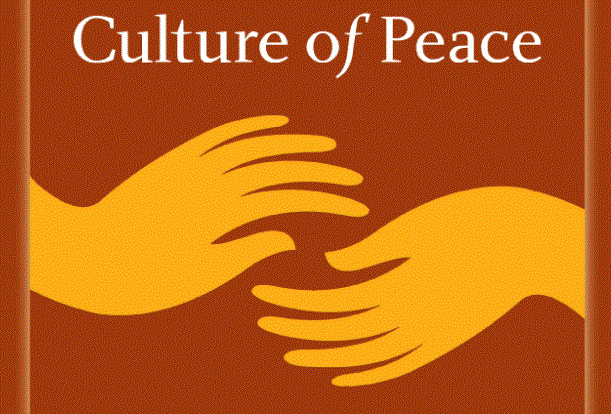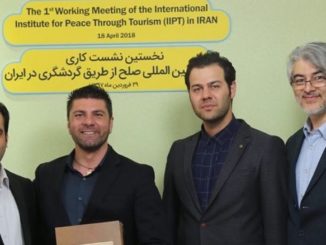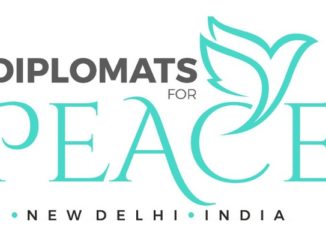
Aziz Abu Sarah is a National Geographic Explorer and a 2014 TED fellow. In 2009, he co-founded MEJDI Tours, a social enterprise that aims to foster peace in the Middle East. MEJDI Tours started by sending tourists to Jerusalem with two guides, one Jewish and one Palestinian, each offering a different history and narrative of the city. MEDJI has now expanded to Iran, Turkey and other regions experiencing cultural conflict.
He is a former executive director of George Mason University’s Center for World Religions, Diplomacy and Conflict Resolution.
In 2013, Abu Sarah hosted Conflict Zone, a Web series for National Geographic. His writing has been published in The New York Times, Haaretz, the Jerusalem Post, Al Arabiya and others.
GUY RAZ, HOST:
OK, so far on the show, we’ve covered politics, race, abortion – all topics where people cannot stand, let alone tolerate, the other side’s point of view. So we thought, let’s push it a little bit more.
AZIZ ABU SARAH: Oh, absolutely.
RAZ: Israel-Palestine – a place where tolerating each other definitely has not worked.
ABU SARAH: Living in a conflict zone is quite a traumatic thing.
RAZ: This is Aziz Abu Sarah. He’s Palestinian, and he grew up in East Jerusalem.
ABU SARAH: When I went to school when I was 6, 7 years old, my mom would give me an onion every morning. Now, it wasn’t because that was my lunch, it was because an onion is what we believed helps if you shot at tear gas. And…
RAZ: If tear gas was shot at you, you would use…
ABU SARAH: …You’d cut an onion and you put it close to your nose. And if you inhale it, the idea is you won’t pass out. And that was one of the important things. Every morning, you know, normally the moms will figure out the sandwich and do you have your homework? My mom would make sure I have my onion. You know, having soldiers on the way being checked or shot at even, that was not an abnormal thing. It was a normal lifestyle.
RAZ: What was your perception of Jews or Israelis?
ABU SARAH: Oh, when I was a child, my understanding was an occupier, an attacker, somebody who limits my freedom, somebody who wants to kill me, somebody who hates me. That’s the only thing I knew. And my only interaction were with soldiers and the settlers who we didn’t like each other. I didn’t have access to anybody else to give me a different point of view.
RAZ: But today, Aziz works on building relationships between Palestinians and Israelis, between Muslims, Jews and Christians. And he uses a tool that might surprise you. We’ll get to what he does in his TED Talk in a bit. But how he came to do this, it actually started with his older brother Taseer (ph), who he kind of worshipped as a kid.
ABU SARAH: He was more of a parent for me than really a brother.
RAZ: This because Aziz was the youngest of seven kids. And by the time he was born, his parents kind of had their hands full.
ABU SARAH: You know, when I went to school my first day, he was the person who took me to school. When I had a problem with my teachers, he’s the one who showed up. When I had my birthday, he’s the one who set up my birthday party.
RAZ: They weren’t just close. Taseer meant everything to Aziz. And so it’s why he was absolutely crushed when one morning, Israeli soldiers came looking for his brother.
ABU SARAH: It was Ramadan. We were woken up around 5 in the morning, and the soldiers came into our room, asked everyone for their ID. And when they saw his ID, they asked him to go with them. We didn’t hear anything for quite a while. Eventually, my dad found out that he was suspected of throwing rocks and that he eventually confessed. We knew only later that he held on and refused to confess and he was beaten up until he did. But by the time he did, he had quite a lot of health damage.
RAZ: Was he eventually released?
ABU SARAH: Yes, but he didn’t spend much time home because right away after he was taken to the hospital. And he died exactly a year after he was arrested.
RAZ: What was the cause that they gave?
ABU SARAH: He had internal injuries. He had spleen failure, he had liver failure and they had nothing they could do to save him. And so to me, it was very clear that somebody was responsible and that somebody was the Israeli soldiers who arrested him.
RAZ: How did that change your life and the way you looked at the world?
ABU SARAH: It felt to me like as if somebody has punched me in the face. And my reaction was I want to hit back. I want the person who killed my brother to feel the pain. But I was 10 years old, so I didn’t know what even that means. What do you do? I just became angry, I became bitter and I started looking for ways to seek revenge.
RAZ: And that meant going to protests and throwing stones at Israeli soldiers.
ABU SARAH: When somebody kills your brother, you hate them. And when you only know of that society, only those people, only the soldiers – the only memory I had was the soldiers and the only encounter I have is negative. So hatred, bitterness, anger – all of these were emotions that I had all through that period.
RAZ: And that’s how Aziz spent most of his teenage years, reeling from his brother’s death and thinking about vengeance. But as he got older, he had to figure out what to do with his life. And he had to grapple with a reality of growing up in this part of the world.
ABU SARAH: Without Hebrew in Jerusalem, you can’t really do anything.
RAZ: If you don’t speak Hebrew there, it’s a lot harder to get a good job.
ABU SARAH: I didn’t speak Hebrew because I thought of it as the language of the enemy, and I was not going to learn it.
RAZ: But Hebrew meant opportunity. So Aziz found an intensive Hebrew class actually meant for Jewish immigrants to Israel.
ABU SARAH: And I signed up for one of those with the thought that I’m going to go and learn the language but not talk to anybody. I don’t like the people there, I’m not going to connect with anyone, I’m just there to learn the language.
RAZ: You kind of have to talk to people to practice.
ABU SARAH: Right, and it was an incredible experience ’cause I get to the class and the teachers were just amazing. I kept think why are they so nice? This doesn’t fit into what I know about the Israelis. And then as we started talking about other things, I realized, yeah, we are very similar. We are extremely similar. And that was, I think, a major change of heart for me.
RAZ: Explain to me what was starting to happen in your mind. I mean, was this challenging your identity?
ABU SARAH: It was an identity crisis. It made me question everything I grew up with. It made me question what about everything else I know? What is right and what is wrong? If that narrative wasn’t fully right, then what other narratives are also not right? And suddenly, the whole dynamic changed where to me, it stopped being us versus them.
RAZ: And that was simply because of face-to-face interaction?
ABU SARAH: It was because of face-to-face interaction but also the kind of people I talked to treated me like a human being, like somebody who has the same rights that they do, somebody who saw me as equal to them. And to hear that from an Israeli, from a Jewish person, just changed everything for me because they weren’t on the other side. And so that Hebrew class has opened a whole new world to me.
RAZ: And that’s when Aziz decided to devote his life to building genuine, real relationships between Palestinians and Israelis – relationships that went beyond just tolerating each other. And so he started by learning about the Holocaust. It was something he kind of had heard about but he’d never really tried to understand. So he first went to Yad Vashem, which is Israel’s Holocaust memorial museum.
ABU SARAH: I was shocked by the atrocities and by the pain. And I found myself sympathizing.
RAZ: He got a job in an ultra-Orthodox Jewish neighborhood.
ABU SARAH: And I was the only Palestinian there. And I loved the place, loved the food.
RAZ: He joined a support group for Israelis and Palestinians who lost family members in the conflict.
ABU SARAH: It was hard. But we realized just the amount of misunderstanding is unbelievable.
RAZ: And all this in an effort to build the kinds of relationships he built in his first Hebrew class. And in the end, he came up with a kind of surprising idea – that the key to moving beyond tolerance might be tourism.
ABU SARAH: We realized millions of people come into Israel and Palestine and they leave very one-sided. They either go visit the Israeli side or the Palestinian side, and they never encounter the other side. And we thought there’s a big problem with that. And so we wanted to do something different.
RAZ: And so what they decided to do Aziz explained on the TED stage.
(SOUNDBITE OF TED TALK)
ABU SARAH: You might be wondering really can terrorism change things? Can it bring down walls? Yes, tourism is the best sustainable way to bring down those walls and to create sustainable way of connecting with each other and creating friendships. In 2009, I cofounded MEJDI Tours, a social enterprise that aims to connect people – with two Jewish friends, by the way. And for example, in Jerusalem, we would have two tour guides, one Israeli and one Palestinian guiding the trips together, telling history and narrative and archaeology and conflict from totally different perspectives.
Imagine with me – if the 1 billion people who travel internationally every year travel like this – not being taken in the bus from one side to another, from one hotel to another taking pictures from the windows of their busses of people and cultures but actually connecting with people. You know, I remember having a Muslim group from the U.K. going to a house of an Orthodox Jewish family and having their first Friday night dinner – it’s the Sabbath dinner – and eating together hamin, which is a Jewish food, a stew.
Just having the connection of realizing after a while that a hundred years ago, their families came out of the same place in northern Africa. This is not a photo profile for your Facebook. This is not (unintelligible) tourism. This is the future of travel.
We tried to show the complexity and say we’re not here to tell you what really to believe. This is not a propaganda trip. This is a trip to show you a place, to show you the real thing about the place, to hopefully inspire you to care about this place and to leave here thinking and feeling what can I do to help these people, to have compassionate on them? You could still be more pro-Israel or more pro-Palestine. That is likely to happen. But maybe you would leave with more compassion. That’s our hope.
RAZ: It’s interesting because asking people to be tolerant isn’t that hard. I mean, asking people to tolerate with contempt somebody who lives down the street, but to just deal with it, it’s not that big of a challenge. Most people can handle that. It’s the next step that’s hard.
ABU SARAH: Yeah, it’s reconciliation, which is what we were trying to do. We realized what we needed wasn’t tolerance but was more reconciliation – bringing people to understand each other, bringing people to see themselves as one, realizing our pain is similar, that our blood color are the same, that our tears are as bitter. And having that understanding made the difference. But think about it, we grow up – regardless not only Israel and Palestine, it’s true here in America, it’s true everywhere.
You grow up with propaganda, and it is very hard to change that unless we change the narrative. If we can do this, I think there’s no way this conflict could survive or any conflict. I think it will make a big change.
RAZ: That’s Aziz Abu Sarah. His company is called MEJDI Tours. You can see his entire TED Talk at ted.com.
(SOUNDBITE OF SONG, “WE GET ALONG”)
SHARON JONES AND THE DAP-KINGS: (Singing) Through darkness and rain, sorrow and pain, we prove again and again and again we get along. Through all of our lives, we get along. Through sorrow and strife, we get along.
RAZ: Hey, thanks for listening to our show Beyond Tolerance this week. If you want to find out more about who was on it, go to ted.npr.org. To see hundreds more TED Talks, check out ted.com. Our production staff at NPR includes Jeff Rogers, Brent Bachman, Megan Cain, Sanaz Meshkinpour and Neva Grant with help from Daniel Shuchman. Our intern is Maria Paz Gutierrez. Our partners at TED are Chris Anderson, Deron Triff and Janet Lee.
9(MDA3NzMxMTkxMDEzMDkyOTU3ODRmYjc2Mg001))



